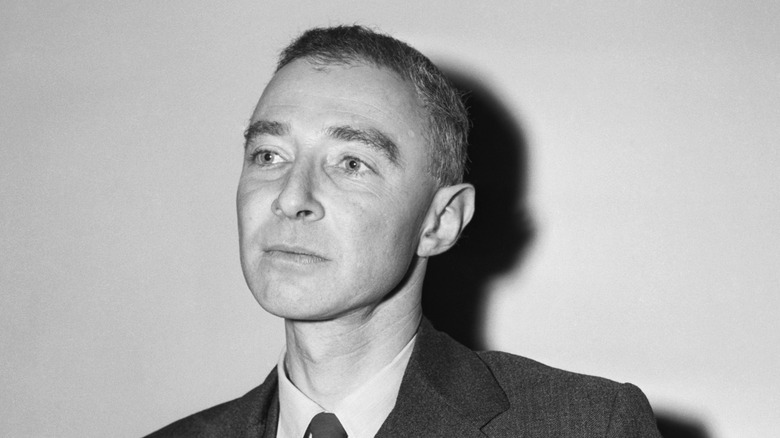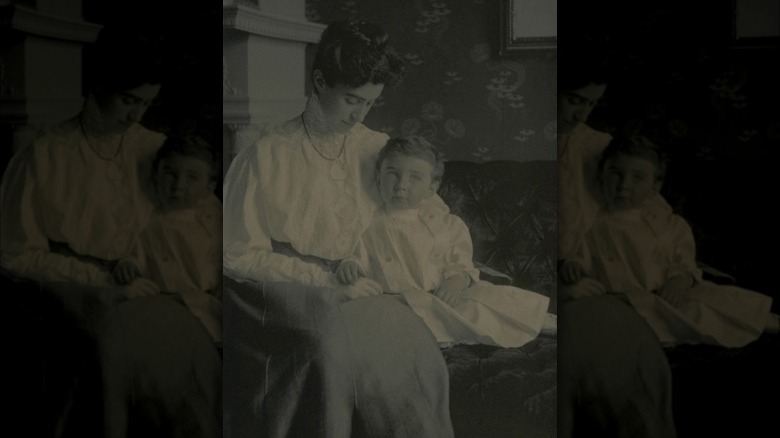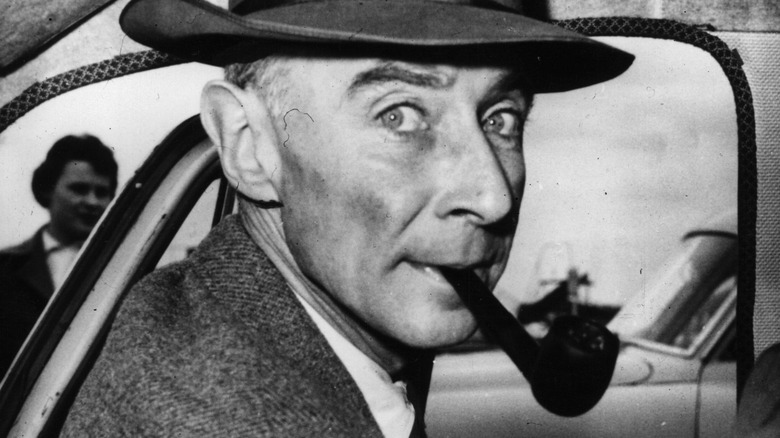The Sad Death Of Oppenheimer, The Man Who Invented The Atomic Bomb
J. Robert Oppenheimer died in 1967, more than two decades after two atomic bombs were dropped on Japan. A lifelong smoker and heavy drinker in poor health at the end of his life, Oppenheimer was diagnosed with throat cancer in 1965 and died two years later at the age of 62. Known as the "father of the atomic bomb," the bombing of Japan concluding World War II in the Pacific Theater proved a sad turning point to the theoretical physicist's career.
For Oppenheimer, at least at first, the development of an atomic bomb was inevitable. As a scientist, his job was to develop the technology; it was up to the politicians to control it (via The New Atlantis). Causing a nuclear arms race between the U.S. and Russia, Oppenheimer expressed regret over what he helped create, and with alleged ties to Communism, he was rejected by the political establishment. Still, once he was diagnosed with cancer, Oppenheimer found some peace, according to Freeman Dyson, who worked at the Manhattan Project, which Oppenheimer led.
Approaching death, Dyson said (via The New Atlantis) Oppenheimer "accepted his fate gracefully; he carried on with his job; he never complained; he became quite suddenly simple and no longer trying to impress anybody." Dyson also worked for Oppenheimer at the Institute for Advanced Study at Princeton University. Oppenheimer was director of the institute from 1947 until he retired in 1966, shortly before his death.
An intelligent and lonely child
J. Robert Oppenheimer was born in 1904 in New York City to wealthy parents, Julius S. and Ella Friedman Oppenheimer. Oppenheimer is characterized as an intelligent and lonely child interested in science, especially mineralogy, and literature —the reading and writing of poetry, in particular. He was educated in progressive politics and secular humanism, and as a boy, he seemed to live a life of relative privilege, as Oppenheimer later said (via the National Park Service), "[M]y life as a child did not prepare me for the fact that the world is full of cruel and bitter things."
While traveling in Europe, Oppenheimer contracted dysentery, and while recuperating, he visited New Mexico for the first time, where the future Manhattan Project would be located. Oppenheimer graduated from Harvard summa cum laude and researched and studied theoretical physics at elite European and U.S. universities. By the late 1920s, Oppenheimer was employed at both the California Institute of Technology and at the University of California, Berkeley, where he met his future wife, Katherine Peuning Harrison.
By 1940, Oppenheimer and Harrison married. Shortly after, the couple's first of two children, Peter Oppenheimer, was born. It was also Harrison's student ties to radical politics that would in part prove Oppenheimer's undoing. Early on in the war, Oppenheimer was already at work researching a potential nuclear power, and by 1942, he was appointed director of the Manhattan Project, in Los Alamos, New Mexico, tasked with the A-bomb's development. (Oppenheimer as a child is pictured with his mother, Ella, above.)
'A most terrible weapon'
Once J. Robert Oppenheimer witnessed the so-called Trinity test A-bomb explosion, and especially after the second of two atomic bombs were dropped on Japan, his views on nuclear technology and atomic weaponry shifted. At the Trinity test explosion, the scientist famously quoted the Bhagavad Gita when he said (via The New Atlantis), "Now I am become death, the destroyer of worlds."
In 1945, Oppenheimer told President Harry Truman he felt he had "blood on [my] hands" for the destruction brought on Japan by the A-bomb, marking the beginning of the end of the scientist's favored place in Washington. Speaking to the American Philosophical Society in the post-war period, Oppenheimer said (via The New Atlantis), "We have made a thing, a most terrible weapon, that has altered abruptly and profoundly the nature of the world ... a thing that by all the standards of the world we grew up in is an evil thing. And by so doing ... we have raised again the question of whether science is good for man."
The cumulative stresses of his purported personal guilt and public humiliation likely did nothing to curb his habits and undoubtedly helped pave the way for his early demise. By 1944 and 1945, J. Robert Oppenheimer was already described as a heavy chain smoker who could burn through 100 cigarettes in a day, as well as consume excessive amounts of alcohol (per Baylor University Medical Center Proceedings). His overall health was reportedly abysmal, and he had a dangerously low BMI.


